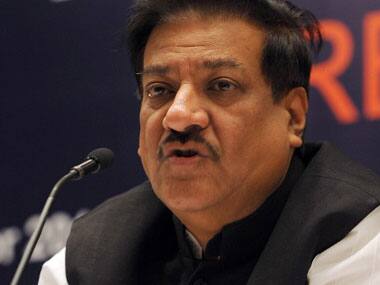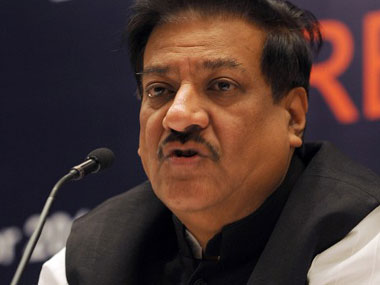There shouldn’t be any surprise if Narendra Modi, holding his first big rally tomorrow as BJP’s prime minister-designate in Mumbai, ploughs into the Congress for aiding and abetting corruption. The grist to his mill would be the content of the 670-page report by the Commission of Inquiry on the Aadarsh scam that was tabled in the Maharashtra legislature yesterday. It makes for an easy target. It talks about the patronage of politicians, including four Congress chief ministers, the quid pro quo for the officials who handled the files, violations of service and conduct rules by the bureaucrats who touched the files that enabled the massive scam, and above all, the refusal of the Maharashtra cabinet to accept the inquiry commission’s report. The Chief Minister, Prithviraj Chavan, who leads the cabinet, has not even attempted to explain the reasons, if any, for the rejection of the report written by Justice JA Patil and former bureaucrat, P Subramaniam. Probably he needn’t for the reasons are horribly obvious. Accepting the report would have very serious political ramifications. Rejecting it, he may have thought, would at most only invite criticism. [caption id=“attachment_130067” align=“alignleft” width=“380”]  Did Chavan have no choice but to reject the report? AFP[/caption] Had the commission’s report been accepted, Sushilkumar Shinde, currently the Union Home Minister, would either have to resign or be sacked. He was one of the four chief ministers cited in the findings under the Commissions of Inquiry Act for providing “politician’s patronage” to the Adarsh project. Vilasrao Deshmukh, Ashok Chavan and Shivajitrao Nilangekar are the others who similarly showered patronage to enable the scam to take shape. By not accepting the report, Prithviraj Chavan has embroiled himself in a controversy and he naturally falls in the line-up with the four other chief ministers implicated by the commission. His political compulsions included the naming of two NCP ministers, Sunil Tatakare and Rajesh Tope. The party’s MLA, the Babasaheb Kupekar, as the Legislative Assembly Speaker, also allegedly facilitated it. On the eve of the elections to the Lok Sabha, for which campaigning is to commence in weeks, it would have been politically imprudent to ensure the sacking of a Union Home Minister and having to axe two ministerial colleagues from a coalition partner. But this decision does not mean he comes out smelling of roses and ends up becoming complicit in providing patronage. The other curious aspect is that both Shinde and Deshmukh, whose roles were looked into by the CBI and were given what the media calls a ‘clean chit’, whereas the Patel-Subramaniam Commission finds Chavan to be involved to the extent of providing patronage to Adarsh. Only a day before the cabinet rejected the findings, the Governor had refused permission to the CBI to prosecute Chavan. There is, therefore, a neat, delightfully abhorrent pattern. The politicians escape, and the officials – seven of whom benefited through quid quo pro and 11 who violated the Service Conduct Rules – can now find relief if retired and absolution if in service. It does not matter that people got flats for favours, and those who could not, got them through benami means_._ The acceptance of the report would have been suicidal but the Congress appears to have decided to brazen it out by rejecting it, despite hit-and-run artist Rahul Gandhi’s latest fad for fighting corruption and making common cause with Anna Hazare. It is unlikely Prithviraj Chavan did not take an opinion from the party high command on how to deal with the commission’s finding. This at one destroys the Chief Minister’s Mr Clean image, much like Mamohan Singh’s is tattered, for countenancing venality. The fact that all the chief ministers are from the Congress does not absolve the Nationalist Congress Party which never had anyone occupying that office. But it constitutes a significant and powerful part of the Maharashtra cabinet. It was apparently the quid pro quo for getting a Governor’s reprieve for Chavan. The report has described the Adarsh adventure as “unscrupulous greed of some persons closely connected with the society.” Twenty-two benami transactions and 25 ineligible members made the Adarsh saga a mirror of the establishment. The report noted the scam has “reflected the images of the many persons who are in or behind it. Adarsh (the society) is not a saga of ideal cooperation but a shameless tale of blatant violations of statutory provisions, rules and regulations. It reflects greed.” Nothing could be more telling a narrative of the way things are run in this country. In other words, it shows how the establishment can and does work efficiently for its own kind, in this case, the powerful and the clever. But notwithstanding all this, the final arbiter in the matter would be the Bombay High Court, which is hearing a public interest litigation on the matter. What the High Court determines the final outcome on the matter. Recently, referring to the size of Indian democracy, not in its size as in the population or number of voters, The Economist had mentioned how 30 lakh elected representatives, run it. It said such a democracy was “a business” in India where, implied in it was, there is a trade. The report on Adarsh report has laid bare how that “business” is run – by patronage. And handsome returns for those who aid it.
Had the commission’s report been accepted, Sushilkumar Shinde, currently the Union Home Minister, would either have to resign or be sacked.
Advertisement
End of Article
Written by Mahesh Vijapurkar
Mahesh Vijapurkar likes to take a worm’s eye-view of issues – that is, from the common man’s perspective. He was a journalist with The Indian Express and then The Hindu and now potters around with human development and urban issues. see more


)
)
)
)
)
)
)
)
)



